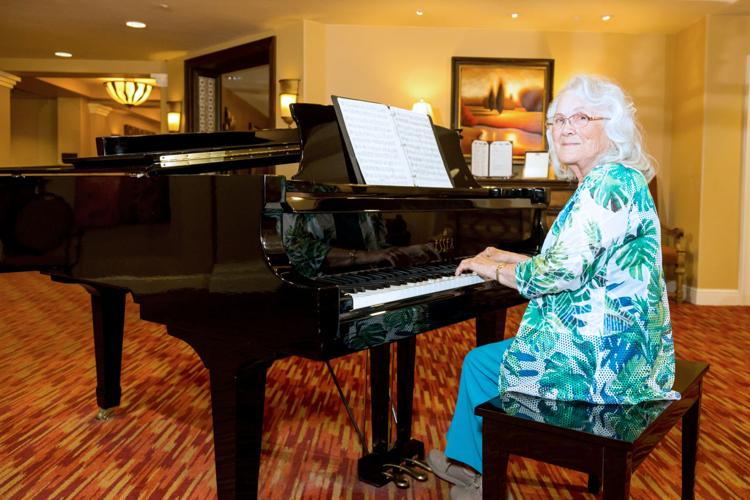If you’re going to enjoy a lifelong hobby, you can’t beat the benefits of playing a musical instrument. In addition to bringing joy to yourself and any listeners you might have, you’re doing great things for your brain.
Marie Hampton, who has been playing the piano for more than 80 years, believes the science. “I don’t think I would continue to function if I didn’t play the piano!” she says. “I think it really helps you hang onto your brain. It’s mental exercise.”
Marie lives at Splendido, an all-inclusive community in Tucson for those 55 and better. She and her husband Joe moved there in 2012, and they had an interior wall in their new apartment home removed and another one moved to accommodate her 7-foot grand piano.
Marie plays popular music for residents at dinner time, using the piano situated in a hallway outside the restaurant entrances at Splendido. She is also the accompanist for the Splendido Singers, and shares piano-playing responsibility for Vespers in the community.
Building Benefits over a Lifetime
Marie has studied piano her whole life, from when she was four years old to when she moved to Splendido. She recalls, “When I was a very small child, my brother was taking piano lessons from a German piano teacher in North Platte, Nebraska—a 32-mile drive from our small town of Paxton. My mother would drive us in and I’d sit and listen to his lesson.”
She begged her mother to let her take lessons but was told she was too young. “I was about four at that time,” admits Marie. She found a way around her mother by paying the pastor’s daughter her 10¢ allowance in exchange for piano lessons. “When my parents saw that I was serious, they started paying for lessons for me,” says Marie. “Later, my Grandfather Cornick saw to it that all the children in our family learned to play the piano.”
Marie’s family moved around quite a bit during her childhood. “Everywhere I lived as a child, be it Nebraska, Wyoming, Oregon, or California, I found a piano teacher,” she says. “I always got to study with somebody.” As she grew older and more skilled, she started teaching piano herself—both private lessons and in a private school. “I’d use the money I earned for my own private lessons, every chance I got!” she says. Over the years, Marie has participated in master classes and had private lessons with Lili Kraus, Karl Ulrich Schnabel, Wilhelm Schwarzott, Peter Vincent Marlotti, and Rosina Lhévinne.
Noteworthy Brain Benefits
Playing an instrument on a regular basis offers multiple benefits for your brain. That’s because it simultaneously works different sensory systems in the brain along with your motor skills. This coordination of efforts provides a workout for your brain—the kind of workout that strengthens connections within the brain and keeps you mentally sharp. In turn, this can improve your memory and cognition; one study showed that musicians perform better on cognitive tests than those who don’t play an instrument.
Musical training has been proven to increase gray matter volume in specific brain regions and strengthen the connections between them. Other research has shown that such training can improve long-term memory, verbal memory, and spatial reasoning. And multiple studies have shown that playing music helps improve concentration—not just when playing, but in all areas of daily life.
It should come as no surprise that playing music can reduce stress, but it can also lower blood pressure, decrease heart rate, and reduce anxiety and depression.

